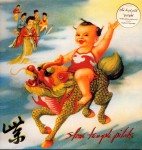One thing I learned a long time ago is that the music of tomorrow cannot be written without the music we have today. Even when I thought Beck was a magical wizard making freak sounds out of a bubbling cauldron in a basement, I soon learned that every talented musician’s work draws from the past just as much as the present.
That is what “Against the Grain” has been about this quarter: demonstrating how a band, such as Crash Kings, can build upon the powerful influences of another band, for example Stone Temple Pilots, to create a refreshing sonic environment that honors the past, yet sounds new and exciting.
Borne from San Diego in the late 1980s, Stone Temple Pilots has often been thrown in with the grunge acts of the ’90s as a lost B-side. But its first two albums, “Core” and “Purple,” which gained the band critical and popular acclaim, highlight a hard-rock group that belongs to so much more.
As principal songwriters for the band, bassist Robert DeLeo and his brother Dean DeLeo, the guitarist, brought forth the hard, Southern blues-style rock that had been missing from the decade. The band, with vocalist Scott Weiland, who led the band through the early ’90s, created a sound that originated from the past, with classical rock, rhythm and blues, and ended in the alternative rock melting pot of the ’90s.
The proof is all in the 1994 single, “Interstate Love Song.” That memorable opening guitar riff that colors the track with the sounds of Southern blues, those drums that seem to move the listener into an almost bossa nova feel and Weiland’s soulful voice, which brings back recollections of the blues vocals of Lead Belly. But despite these influences, the song belongs nowhere else but 1994. That heavy layering of distorted guitars within a song that deals with heroin abuse – it couldn’t have been written at any other time.
The sound that Stone Temple Pilots was able to engineer in the early ’90s is an incredible toast to the legacy of American music and the ability of the present to push the past into the future. This is just what the Los Angeles rock band, Crash Kings, has begun to demonstrate: when three talented musicians, with knowledge and appreciation for past musical movements, are put in a room together, the product can change the way popular culture perceives a rock ’n’ roll band.
Since 2006, Crash Kings has been the brainchild of musician and vocalist Antonio Beliveau, who, along with his brother Mike on bass and original drummer Jason Morris, has taken the challenge to become a hard-rock band without the most important element in the tool belt, the electric guitar.
With a custom-made clavinet, an electric keyboard that mimics the sound of an electric guitar, equipped with a whammy bar, Beliveau’s musical talent allows him to sonically transform the keys of the clavinet into the frets of the guitar. Influenced by Stone Temple Pilots, Crash Kings builds its sound around the clavinet, with full-sounding distortion on the bass guitar, and intricate drumming that showcases the hard rock sound that influences the band.
With the band’s debut eponymous album in 2009 receiving popular acclaim, Crash Kings stands out for its blending of classic rock, with Beliveau’s vocals that fall between the blues vocals of Scott Weiland and a range like that of Freddie Mercury. Evident on the band’s first single, “Mountain Man,” which topped the U.S. Alternative Songs chart, is its awareness and embracement of the music that came before, and its refusal to confine itself to the past. Audible in the track is the heavy distortion and pounding drums of hard rock that blend with soulful vocals to produce a refreshing piece of new music.
As Crash Kings prepares to release its second studio album this year, it is certain that what it has done will inspire future musicians to adapt the sounds of past artists as music evolves.
From Stone Temple Pilots to Crash Kings, this column has been as simple as the connection between two bands, and yet has encompassed the complex, inner workings of music from generations past to the promise of those to come. It has been music that went against the grain today to learn from the past, in order to build tomorrow.
